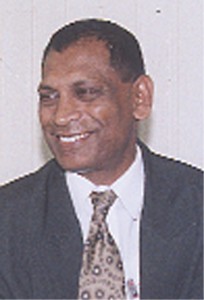By the end of this year the correlation between alcohol and injuries and alcohol and gender in Guyana will be known as research is to be conducted through the PAHO/WHO-funded Valencia project.

Such research can provide much needed insight into dealing with the issue of alcohol abuse in Guyana as while it is known that this affects the country in several different ways, there is hardly any supporting data. Minister of Health Dr Leslie Ramsammy has repeatedly said that alcohol abuse costs the health sector million of dollars yearly through road accidents and providing mental health care.
Announcing the Valencia project at the opening of a two-day workshop yesterday, PAHO/WHO Health Promotion Advisor Renee Franklin-Peroune said its objective was to provide technical assistance and support to the governments of six participating countries so that they can adequately plan and implement strategies that have an impact on alcohol consumption.
Participants of the workshop, being held at the Cara Lodge, were drawn from the National Drug Demand Strategy Committee that was put together to oversee the development and implementation of the drug master plan, which was launched in 2005.
According to Franklin-Peroune, the six countries are Panama, the Dominican Republic, Honduras, Guate-mala, Nicaragua and Guyana and the criteria for their choice was their level of development in comparison with other countries in the region, request for assistance with alcohol abuse and whether the country is currently working on alcohol problems. She said Guyana had asked the PAHO/WHO local office for assistance in the areas of road traffic injuries, domestic violence and mental health.
Franklin-Peroune said that for this year, the countries should be focusing on implementing delivery interventions that would involve the research done and training for the implementation of the research.
She said the first half of the year will be used to draw the samples for the research, while in 2010 the data analysis and preparation of the report would be done.
Through workshops in the different countries information would be collected for the formulation of policies that speak to the specifics of each participating country. The project would also see the training of primary health care workers in the countries to identify alcoholism and to treat and offer support.
Speaking at the opening of the workshop Ramsammy said that Guyana has made important strides in addressing alcoholism as it recognised that the issue is a major problem. The minister pointed out that it is no longer true that Guyana does not have programmes to help people who may now become trapped in the “ravages of alcohol.” He said there were substance abuse programmes in the public health sector as well as those run by non-governmental organisations (NGOs).
He said churches in Guyana have done a tremendous amount of work in addressing the issue of alcohol abuse and use, but he issued a call for them to do more. “We have to save our young people and in this case save them so that they can live longer so we could also save their souls,” the minister said to the church leaders.
The minister challenged the participants and all those who are involved in the fight against alcoholism to make the issue a priority since alcohol has “destroyed too many lives, too many families and alcohol has contributed too much to underdevelopment in our country.” He said while the country’s young people need to be educated on the issue it should be backed up with vigilance as too many young people are still going to the rum shop to purchase alcohol for older people.
“…From the church’s perspective it is a sin; from the legal perspective it is not only immoral it is breaking the law for young people to go [and purchase rum]… the child is innocent,” the minister said. “When older people send children to buy alcohol they should be locked up… The shop owners have no less liability in this, they ought to know better too and not sell to young people and they should be locked up too, twice as much.”
Ramsammy stressed that the laws and policies should be made clear and there should be no leniency in enforcing the law.
And while it is good to educate and take preventative measures with regard to alcohol the minister noted that programmes should also take into account that there are already persons who are addicted to alcohol and programmes need to be designed to provide support for them.
Meanwhile, Health Promotion Coordinator at the Ministry of Health Lucy Anderson said that at present there is no national comprehensive programme that focuses specifically on alcohol. However, it is catered for in the five-year drug strategy master plan, she said, and there are some other national regulations that deal with the sale of alcohol.
She noted that different government agencies focus on different aspects of the issue such as the Ministry of Home Affairs, which looks at enforcement of the relevant legislation and the Ministry of Human Services and Social Security being responsible for domestic violence and alcohol abuse. The Ministry of Finance and the Guyana Revenue Authority (GRA) have the responsibility for the setting of taxes and issuing of licences while the Health Ministry deals with treatment and rehabilitation.
According to Anderson there are some restrictions on marketing and advertising both in the print and television media mostly for children and religious programming and the consumption of alcohol products on some premises.
Over the two days the participants are expected to learn about existing research, resources and tools in the field of underage drinking prevention. They are also expected to learn about the concepts of research-based, effective environmental strategies related to the prevention of underage drinking and research-based, effective enforcement operations related to the prevention of underage drinking.





